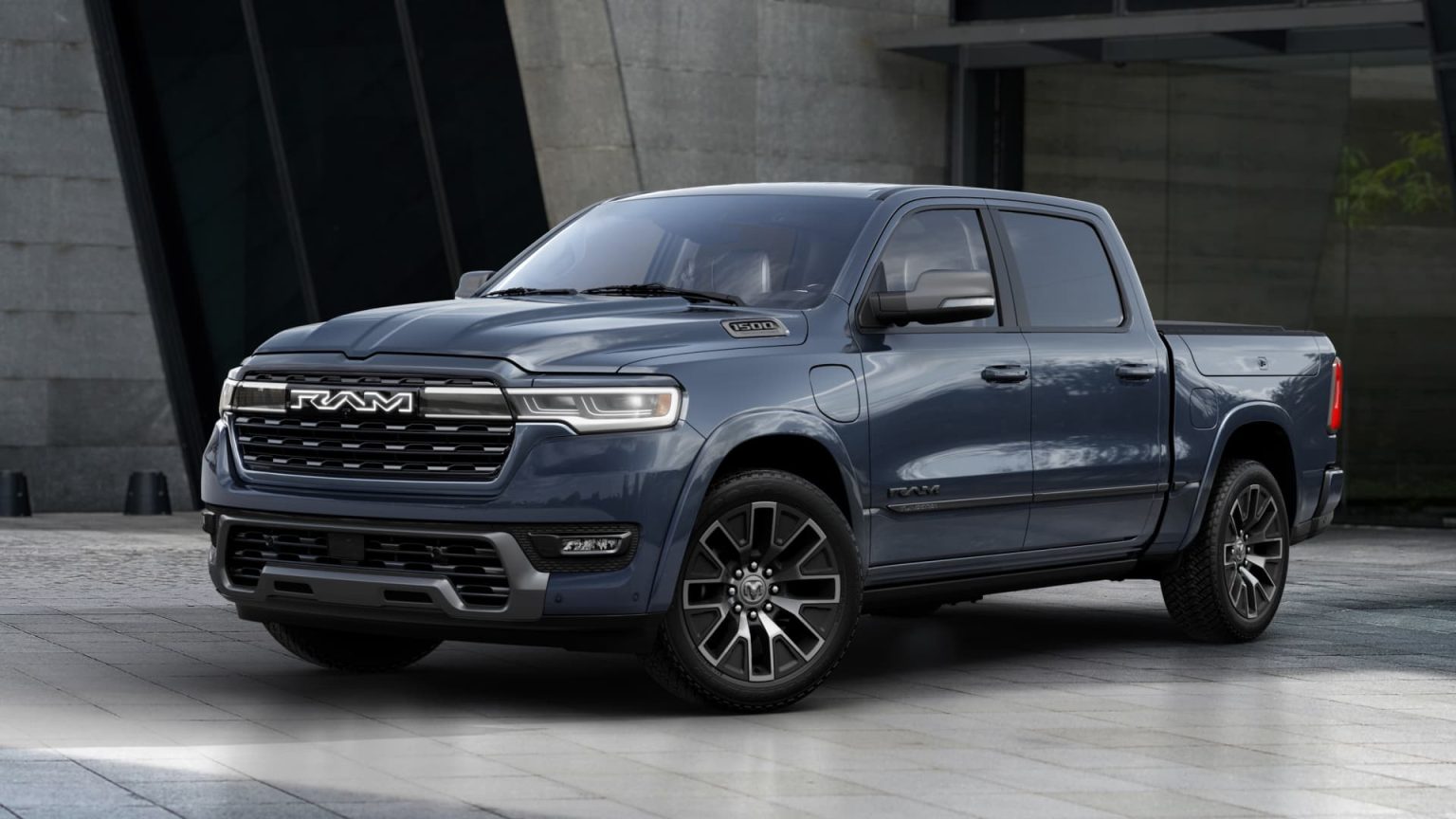DETROIT — Automaker Stellantis plans to produce an industry-first electric pickup truck called the Ram 1500 Ramcharger that’s equipped with an electric generator and a gas engine.
If that sounds like an oxymoron, here’s how it works: The truck can operate as a zero-emissions EV until its battery dies and an electric onboard generator — powered by a 27-gallon, 3.6-liter V6 engine — kicks on to power the vehicle.
The outcome is a truck with the benefits of an EV, such as fast acceleration and some zero-emissions driving, without the range anxiety synonymous with most current electric vehicles, according to Ram CEO Tim Kuniskis.
“This is the ultimate answer for the battery-electric truck. No one else has got anything else like it,” Kuniskis told reporters during an event. “This is going to be a game changer for battery-electric trucks.”
The 2025 Ram 1500 Ramcharger is expected to go on sale in late 2024 alongside a previously revealed all-electric Ram 1500 truck without a gas-powered engine or range-extending electric generator.
Stellantis estimates the range of the Ramcharger to be up to 690 miles, including up to 145 miles powered by a 92 kilowatt-hour battery when fully charged without the extended-range power from the gas engine and 130 kilowatt electric generator.
That range compares with up to an expected 500-mile range of the all-electric Ram 1500 REV pickup. It also tops the current Ram 1500, which has a 3.6-liter V-6 engine and an up to 26-gallon tank with a total range of up to 546 miles, according to the U.S. Environmental Protection Agency.
Stellantis did not announce pricing of the Ramcharger, which was revealed Tuesday as part of a redesign of current gasoline-powered Ram 1500 pickups for the 2025 model year.
‘Not a PHEV’
Kuniskis said the Ramcharger is meant as a bridge between traditional trucks with internal combustion engines and all-electric ones, which currently face significant hurdles regarding charging infrastructure and range anxiety, especially when the vehicles are towing — a main reason to purchase a truck.
Such improvements could be a differentiator for the brand, according to Stephanie Brinley, associate director of AutoIntelligence for S&P Global Mobility.
“It works to address the fact that right now the industry and the pickup truck segment in particular is not ready to just flip to EVs 100%,” she said. “It addresses some of those performance and range anxiety concerns, and it’s strong.— But the difficult part is going to be getting consumers to really understand what it does.”
Similar propulsion technology — referred to as extended-range electric vehicles, or EREVs — is available in overseas markets, specifically China. It’s also similarly been offered in vehicles such as the discontinued Chevrolet Volt sedan from General Motors.
Stellantis engineers said the main difference between the technology of the Ramcharger and the Volt is that the truck is being exclusively propelled by electric motors, not the vehicle’s engine, once the battery dies. It’s also expected to be the first application of it in a production full-size pickup truck.
The Ramcharger features 663 horsepower and 615 foot-pounds of torque and can achieve 0 to 60 miles per hour in 4.4 seconds, Stellantis said. The truck will be capable of bidirectional charging, where the vehicle acts as a generator to power appliances or even an entire home, the company said.
Kuniskis, who also leads Stellantis’ Dodge brand, declined to comment on whether the technology of the Ramcharger will be used in other vehicles. Other Stellantis brands include Chrysler, Jeep and Fiat in the U.S.
The Ramcharger operates differently from current plug-in hybrid electric vehicles, or PHEVs, that offer a range of all-electric driving, followed by an engine powering the vehicle after the battery is depleted.
“The Ramcharger is not a PHEV,” Kuniskis said. “It’s a battery-electric truck with its own onboard, high-speed charger.”
“There’s no connection between the engine and the wheels,” he said. “The gas generator is only there to charge the battery.”
Ram’s truck strategy is different from its leading competitors GM and Ford Motor. The latter is offering traditional, hybrid and all-electric versions of its F-150 full-size truck, while GM has said it plans to transition from traditional trucks to electric ones without the use of hybrids.
Stellantis currently offers PHEV versions of vehicles such as the Chrysler Pacifica minivan and Jeep Wrangler and Grand Cherokee SUVs.
Bye-bye Hemi
The design of the Ramcharger is a mix between the all-electric Ram 1500 REV and the refreshed gas versions of the traditional trucks, which will be available early next year.
The Ramcharger includes illuminated lines across its grille from the headlamps, new badging that debuted on the all-electric truck and other design and facia elements between the two.
For the traditional Ram 1500 models, the biggest change is the company is dropping its well-known Hemi V-8. Replacing the current 5.7-liter Hemi engine offered in the truck will be a twin-turbocharged, inline-six-cylinder engine called the Hurricane.
“Some customers are going to be upset that you’re not going to have a Hemi in there,” Kuniskis said. “Sure, the Hemi’s an absolute legend. Americans love the Hemi, but this thing flat out outperforms the Hemi.”
The 3.0-liter Hurricane engine is rated at 420 horsepower and 469 foot-pounds of torque, while a high-output version of the engine is rated at 540 horsepower and 521 foot-pounds of torque. That compares with the current V-8 Hemi at 395 horsepower and 410 foot-pounds of torque.
Inline-, or straight-, six-cylinder engines have been used in U.S. vehicles by automakers such as BMW and Jaguar, however, they’re far from mainstream in the U.S.
Other changes to the trucks include a new luxury model called Tungsten and a performance variant called RHO replacing Ram’s high-output TRX pickup that is equipped with a Hemi 6.2-liter V-8 capable of 702 horsepower and 650 foot-pounds of torque.
Read the full article here




